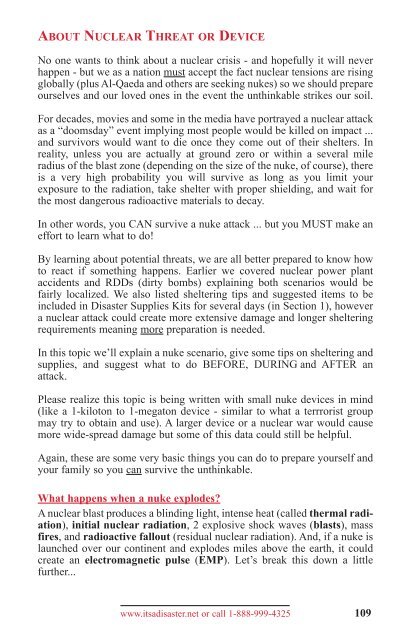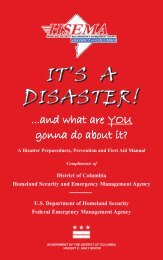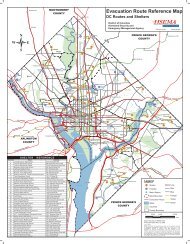disaster 5th 1108_5th ed 2011 - Homeland Security and Emergency ...
disaster 5th 1108_5th ed 2011 - Homeland Security and Emergency ...
disaster 5th 1108_5th ed 2011 - Homeland Security and Emergency ...
You also want an ePaper? Increase the reach of your titles
YUMPU automatically turns print PDFs into web optimized ePapers that Google loves.
ABOUT NUCLEAR THREAT OR DEVICE<br />
No one wants to think about a nuclear crisis - <strong>and</strong> hopefully it will never<br />
happen - but we as a nation must accept the fact nuclear tensions are rising<br />
globally (plus Al-Qa<strong>ed</strong>a <strong>and</strong> others are seeking nukes) so we should prepare<br />
ourselves <strong>and</strong> our lov<strong>ed</strong> ones in the event the unthinkable strikes our soil.<br />
For decades, movies <strong>and</strong> some in the m<strong>ed</strong>ia have portray<strong>ed</strong> a nuclear attack<br />
as a “doomsday” event implying most people would be kill<strong>ed</strong> on impact ...<br />
<strong>and</strong> survivors would want to die once they come out of their shelters. In<br />
reality, unless you are actually at ground zero or within a several mile<br />
radius of the blast zone (depending on the size of the nuke, of course), there<br />
is a very high probability you will survive as long as you limit your<br />
exposure to the radiation, take shelter with proper shielding, <strong>and</strong> wait for<br />
the most dangerous radioactive materials to decay.<br />
In other words, you CAN survive a nuke attack ... but you MUST make an<br />
effort to learn what to do!<br />
By learning about potential threats, we are all better prepar<strong>ed</strong> to know how<br />
to react if something happens. Earlier we cover<strong>ed</strong> nuclear power plant<br />
accidents <strong>and</strong> RDDs (dirty bombs) explaining both scenarios would be<br />
fairly localiz<strong>ed</strong>. We also list<strong>ed</strong> sheltering tips <strong>and</strong> suggest<strong>ed</strong> items to be<br />
includ<strong>ed</strong> in Disaster Supplies Kits for several days (in Section 1), however<br />
a nuclear attack could create more extensive damage <strong>and</strong> longer sheltering<br />
requirements meaning more preparation is ne<strong>ed</strong><strong>ed</strong>.<br />
In this topic we’ll explain a nuke scenario, give some tips on sheltering <strong>and</strong><br />
supplies, <strong>and</strong> suggest what to do BEFORE, DURING <strong>and</strong> AFTER an<br />
attack.<br />
Please realize this topic is being written with small nuke devices in mind<br />
(like a 1-kiloton to 1-megaton device - similar to what a terrrorist group<br />
may try to obtain <strong>and</strong> use). A larger device or a nuclear war would cause<br />
more wide-spread damage but some of this data could still be helpful.<br />
Again, these are some very basic things you can do to prepare yourself <strong>and</strong><br />
your family so you can survive the unthinkable.<br />
What happens when a nuke explodes<br />
A nuclear blast produces a blinding light, intense heat (call<strong>ed</strong> thermal radiation),<br />
initial nuclear radiation, 2 explosive shock waves (blasts), mass<br />
fires, <strong>and</strong> radioactive fallout (residual nuclear radiation). And, if a nuke is<br />
launch<strong>ed</strong> over our continent <strong>and</strong> explodes miles above the earth, it could<br />
create an electromagnetic pulse (EMP). Let’s break this down a little<br />
further...<br />
www.itsa<strong>disaster</strong>.net or call 1-888-999-4325<br />
109





